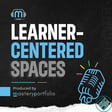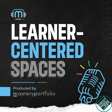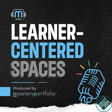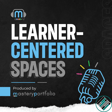Become a Creator today!Start creating today - Share your story with the world!
Start for free
00:00:00
00:00:01

Ingrid Skousgard says assessment is a living organic thing.
Shout puts to Annemarie Roeper, Joseph Renzulli, George Betts (Autonomous Learner Model), Katie Novak, Catlin Tucker
Music by AudioCoffee: https://www.audiocoffee.net/
Transcript
Introduction to the Podcast
00:00:00
Speaker
Welcome to the Learner Centered Spaces podcast, where we empower and inspire ownership of learning. Sponsored by Mastery Portfolio, hosted by Starr Saxton and Crystal Frommert. In each episode, we will bring you engaging conversations with a wide variety of educators. both in and out of the classroom. This podcast is created for educators who want to learn more about how to make the shift toward learner-centered spaces for their students, schools, and districts, or education at large. The Learner-Centered Spaces podcast is a member of the Teach Better Podcast Network. Get ready to be inspired as we dive right into the conversation with today's guest.
Guest Introduction: Ingrid Skousgard
00:00:46
Speaker
We are so excited to have Ingrid Skousgard on the show today. Her passion is to create a positive and enriching, learner-centered environment for the amazing children and guides who come to her school called Aspire Savannah. As a former commercial photographer, she learned teamwork, giving and receiving critique, and working with an eye towards improvement. She brings these skills to her role at Aspire Savannah. We are looking forward to our conversation with Ingrid today. We're so excited to be talking to Ingrid this morning.
Ingrid's Educational Journey
00:01:21
Speaker
So Ingrid, would you be willing to tell us a little bit about a defining moment in your education journey? Oh gosh, I mean, i there are so many because education is lifelong. um I suppose um as a young person, um
00:01:39
Speaker
sort of remembering it at one point where I sort of sort of stopped learning in school, sort of sort of checked out maybe around second grade a little bit, still make good grades and honor roll, but sort of stopped actually being engaged. um And so I think then when my son started ah kindergarten and I took him to school, I remember dropping him off and ah tearing up and crying a little and not because he was big or grown up or he was going to be gone for the day. I was actually really excited for him to be gone for the day. But um because just the smell of the school reminded me of kind of that sort of um shutting down and checking out kind of thing.
00:02:26
Speaker
um And um I didn't really think about school um for quite a while until um that kindergarten experience for my son, which was okay. um It wasn't bad. It wasn't good, but it definitely reminded me that, um you know, you could be looking at 13, maybe more years if university isn't very exciting of um actually not really being engaged in your learning.
00:02:56
Speaker
Wow, let's how do you navigate that? like Watching your son, having that own experience for yourself. what What do you do to try to make it better or do you just suck it up and stick it out? like what' what was How did you handle all of that?
The Start of a Micro School
00:03:14
Speaker
Well, we had some friends who were starting a small micro school and they were really interesting people, spoke multiple languages, just a little bit eccentric, but very interesting and intelligent people. and um
00:03:30
Speaker
And so I thought, yeah, I'll switch and send them over to their school um when they open it. And then they actually needed help um getting it started as far as boots on the ground people. So I ended up helping them with that. And um and and so that sort of started the whole the whole journey towards not doing regular regular school anymore.
00:04:00
Speaker
So I'm excited that you started talking about this. And usually this is the part where we talk about, you know, what do learner centered spaces look like, feel like, sound like. um And you're a pretty unique
Montessori Principles in Learner-Centered Spaces
00:04:13
Speaker
situation. So as you think about how you've actually created that space, can you share with our listeners What came of that experience and how you tried to create a unique situation that was truly learner centered? Sure. Well, it um it has sort of the benefit in a way of not being a regular classroom and then figuring out how do we shift this.
00:04:38
Speaker
to something more learner-centered and student-led. It started with a smaller, you know, working at a smaller school that was based off Montessori. I got a Montessori um credential and Montessori's always been very learner-centered. So building off that as a base instead of um what most school, you know, um sort of a traditional school um from the United States that ah Montessori, she had come over um at the beginning of the 20th century
00:05:16
Speaker
And people were very excited about what she was doing, but then she sort of got poo-pooed by um Columbia University there at the Teachers College. And her ideas sort of disappeared for favor of other ideas. and um And so most schools in the US sort of been shaped by that group from Columbia University um there in the early 20th century. And we're building off a Montessori base instead, which I think the bones of which are much more student centered. And so I think it's just an easier, it's an easier buildup.
00:05:59
Speaker
So what does learning look like in your space? What does it look like feel like? How do you set that environment up? What are kids doing in that paradigm? So in um in the youngest group, it looks the most Montessori like because um Montessori only developed her learning materials up to maybe
00:06:25
Speaker
Some say kindergarten, but her and her son, they they did a few things a little bit older, but definitely it eases out around nine years
Modern Adaptations of Montessori Materials
00:06:34
Speaker
old for sure. so In the youngest group, it looks the most Montessori. We have some Montessori materials, but a lot of younger learners now don't connect with them as as much. Montessori developed her materials to replicate children's toys so that they would look at the materials and say, oh, these look like my blocks. These look like the things I play with. these look And they would naturally be attracted to them. And if they weren't attracted to them on the shelf, they would take them off the shelf and get rid of them and try new materials. So they really worked hard to have materials that engaged the children and
00:07:13
Speaker
and that the children were drawn to because they looked so much like their toys. um so in In the spirit of that, we're finding a lot of them will enjoy some of the online platforms like for math with that are a bit gamified um and that have um everything set up more like puzzles. They really love puzzles. and um And so we try to have something engaging. um Some things, though, might be engaging, but there isn't the learning there. So those materials absolutely do not work.
00:07:51
Speaker
um and We try to get them engaged in a material they can enjoy and give them a set amount of time where they have a selection of a couple of materials, which that's very Montessori. And so it's sort of, um, I like the way Katie Novak says firm goals, flexible means. So there'll be a firm goal for learning, and then there'll be a couple of different ways they can get there. Um, and a set amount of time we have set aside for
00:08:22
Speaker
for that, whether it's math or ELA. and and um And it sort of follows that up through the older grades in a way too. That's where it starts in the ah younger. I love Ingrid that you you started with the history of, a brief history of Montessori versus more of the factory ah type of model of education because I think we could dig really deep into history. um We could look into grading, we could look into
00:08:55
Speaker
you know training workers for factories is what was going on in the early 20th century and the how education was shaped in the traditional classroom looked like then. I think you're right. I've worked for a school that was started by a group of of nuns in the 1700s. that was so long ago, but the foundation was there because they believed in the heart of the student and um you know the whole child. And I think that that foundation permeated through the centuries, through that school. And it was just ah it' such a beautiful environment and it's a still a great school system that we have today. um So history of a founding of the ah education system is so important. So thank you for sharing that.
00:09:43
Speaker
And I think a lot of schools have so much to learn from the Montessori model, whether we're a Montessori school or not, right? We have so much we could borrow and and learn from. So my question for you, because I'm not in a Montessori school, but I've i've observed Montessori schools. I have friends who are Montessori teachers. And I'm always curious about assessment because we're talking you you used that quote from Katie Novak about the firm goals. So we want to assess our students meeting those goals. So I'm curious about your ideas around assessment, formative or summative for both. Yeah, that's that's a great question. And it's interesting because I feel i think about that one sometimes.
Continual Assessment in Education
00:10:25
Speaker
um it's It can get complicated, right? so the um
00:10:31
Speaker
So say there's a firm goal going back to the the younger ones um to understand the base 10 number system. So we can do an assessment and it can be sort of in a Montessori style. It can be formative or summative in that if they if they show that they don't understand the concept, then you simply put the material aside, keep working on it. check again later. If they do show that they know the material, then you know they move they know the material and you can move on.
00:11:07
Speaker
to the next thing that sequentially would come after understanding base 10. So you're just constantly in that way checking in and you you just keep checking in to see where they are. And then if they aren't where they need to be, by working with them, you can see where the gap is and you direct them towards an exercise that'll fill that gap. and then you know, you'll check for base 10 understanding again. So, um, but the interesting thing is I've seen, um, children that will completely have like show that they understand base 10 according to the materials in, um, kindergarten.
00:11:51
Speaker
And then something will come along in maybe a third grade level math exercise that um requires a base 10 understanding with a twist. And it's almost like they forgot what base 10 was. And we might have to go back to one of those materials again to sort of remind them so that they're able to do the more complicated level. So it I feel even when someone shows they have a mastery of a concept, a couple of years later, there there can still be, it's not like a machine that's just,
00:12:30
Speaker
learned this thing completely and it it's there exactly the way you want it to be and then it builds exactly the way you think it will. um Sometimes even learners with very good understanding that are exemplary learners, there will need to be this sort of going back at times. um So it feels like you can, it feels like assessment is just this constant, um almost living organic thing that's just going on over and over.
00:13:04
Speaker
You're absolutely right that i mean we're we're dealing with human beings, right? Not machines. And and no matter the age, you know it's can't just check a box and say, oh, you've got that skill. you've got that it's It's constantly being evaluated. It's building upon itself. and um That's why I'm a math teacher because I love the beauty of concepts building on themselves and developing over time. so My next question for you Ingrid is, what advice would you give a teacher who would like to be to become more learner-centered in their space? That's a hard one and for me to answer because I don't have any traditional classroom experience.
00:13:48
Speaker
um
00:13:51
Speaker
So it's hard knowing maybe the challenges they face. I try to read things all the time um to learn more and and see what's going on. It could be um administrative or there may be learner centered things they want to do in their classroom that they may face challenges that that I wouldn't even understand um through administration or um
00:14:20
Speaker
or like their structure that's already there. um
00:14:27
Speaker
can i read Can I rephrase the question? download So you you were telling your your um powerful story at the beginning about your own experience as a student. If you could go back in time, what advice would you give your teachers at that time when you were in second, third grade to make the environment ah more engaging for you? I mean, they'd have to do the whole thing differently. It would have to it would have to be it would have to be very different. um i think I think I would have really enjoyed um the materials and the autonomy um because in my second and third grade class, it was all um mainly just writing in books, workbooks and and worksheets and writing, um which which can be very useful. there's There are times that that's
00:15:21
Speaker
the best way to go, not saying that that's a bad thing in and of itself, but um we all had to move together just the way it was set up. We had to move together and and everything was just written. If there had been more hands-on and more autonomy, um that would have been great for me. and ah people The differentiation didn't happen at that time either. and so If you were already knew the material, you had to just kind of sit and wait for everyone else to to catch up. and um And that meant you just sort of had to practice your skill of checking out and being patient. And then that checkout can just be kind of what you mainly do in school. So yeah, autonomy, hands-on and differentiation.
00:16:15
Speaker
Wow, Ingrid. I think all of those pieces of advice are so important. And even though your paradigm is considerably different than like traditional education, I do believe that you probably have a sense in your heart of why folks come to you versus why they would want to send their children to something more traditional. um And in that way, I think that your unique understanding and the environment you're trying to create really do create an alternative but atmosphere for students who need something different the way that you had said yourself.
Influences on Ingrid's Approach
00:16:53
Speaker
So to that end, thinking about people who have influenced your learning experience in a positive way, you know who who are the people who deserve recognition or people who you look to to get better learner-centered spaces for the kiddos you teach? um i'm I'm just reading books all the time. like justhu then Then it becomes a mishmash in my brain, but um one of the books I've recently read that I thought was very interesting, I believe the woman has passed away, is Anne Marie Roper,
00:17:26
Speaker
roper ropierre and she had opened a school in Michigan um after World War II. and is a little bit more traditional school and then it became a bit more learner centered and from many years ago and her experiences are interesting to read. um When I did my master's classes in gifted education, I really um enjoy i
00:17:57
Speaker
Renzulli, Joseph Renzulli, he is at University of Connecticut and he has really interesting um research on um It's sort of a gifted enrichment model. um Also, um there's a gentleman by the last name Betts who created the autonomous learner model. And I feel like we really use a lot of autonomous learner model and Renzulli's studies um to to create our space.
00:18:30
Speaker
um I mentioned Katie Novak, um her videos are a hoot, and she's written some books with a woman named Katlyn Tucker, um which are great for me because they come from a traditional education background, so that helps me sort of see what's going on, how traditional education is moving towards learner-centered. and the way we're doing learner-centered and where each different group has maybe be done a little bit better than the other. So you can take the best from both worlds. um um Yeah. Well, thank you for sharing that. And where could our listeners find you online? um We have a website for the school, but I don't really do an online i don't do an online presence.
00:19:19
Speaker
So is it okay to put your school in ah the school website? show that's all right yeah maybe Maybe someday, but right now ah social media seems more of a distraction than a help for me. so yeah that i get one Well, thank you so much Ingrid for being on the show. I think you've given us some a lot of things to think about in no matter what type of education setting that we're in that we could always keep growing. So thank you for your time. And thank you so much for for putting together Mastery Book. It's a huge it's a huge help. We hope you enjoyed the conversation as much as we did. If you'd like any additional information from the show, check out the show
Engagement and Contact Information
00:20:04
Speaker
notes. Learn more about Mastery Portfolio and how we support schools at masteryportfolio dot.com. You can follow us on X at MasteryForAll and LinkedIn in our Mastery Portfolio page.
00:20:19
Speaker
We'd love for you to engage with us. If you'd like to be a guest in the show or know someone who would be an inspiring guest, please fill out the survey found in the show notes. And we'd love your feedback. Please write a review on your favorite podcasting app.



